Whether you’re enjoying a morning cup of coffee or winding down with a soothing herbal tea, your beverage choices have a direct impact on your gut health.
Whether you’re a busy professional, a concerned parent, or someone simply tired of the tummy turmoil, this article promises to shed light on the beverages that can calm your digestive distress. Picture the comfort of a warm, soothing tea or the refreshing zest of a carefully chosen smoothie—these are the sensations we’ll explore together, with insights from my own journey through the landscape of gut health.
As we go on this flavorful journey, expect to uncover a treasure trove of drinkable delights and no-go potions for IBS management. We’ll discuss the soothing effects of peppermint tea, the potential pitfalls of caffeine, and the role of dairy alternatives in your diet.
Get ready to quench your thirst for knowledge as we reveal tips and tricks to keep your gut happy and your mind at ease. So, grab your favorite mug or glass, and let’s get ready to toast to better gut health. Keep reading to become your own expert mixologist of gut-friendly and IBS-friendly beverages.
- Related: Food With IBS

Best and Worst Drinks for IBS – Key Takeaways
- Hydrate with Water: Drinking 8-10 glasses of water daily can lubricate your digestive tract, regulate bowel movements, and soothe an irritated gut, all of which are essential for managing IBS symptoms.
- Low-FODMAP Smoothies: Nutrient-dense low-FODMAP smoothies, made with fruits low in fermentable sugars, offer a nutritious and gentle option that can be soothing for IBS.
- Herbal Teas for Gut Calm: Caffeine-free herbal teas like chamomile, peppermint, and ginger can reduce inflammation, ease muscle spasms, and aid in digestion, making them a comforting choice for IBS relief.
- Lactose-Free Milk and Plant Milks: Lactose-free milk and plant milks like soy, almond, and coconut offer safe and flavorful dairy alternatives that are easier on the gut for those with lactose intolerance or IBS.
- Probiotic Drinks for Balancing Gut Health: Probiotic drinks like kombucha, kefir, and yogurt can help restore healthy gut flora, but it’s important to opt for unsweetened or low-sugar varieties to avoid triggering IBS symptoms.
- Decaffeinated Beverages: Switching to decaffeinated options like coffee and herbal teas can help manage IBS symptoms, as caffeine can act as a gastrointestinal irritant.
- Non-Carbonated Soft Drinks: Non-carbonated soft drinks, including herbal teas, fruit-infused water, and ginger ale, offer refreshing options that are easier on the digestive system.
- Alcohol Alternatives: Choosing low-FODMAP alcoholic beverages and mixers can allow individuals with IBS to enjoy an alcoholic drink without exacerbating their symptoms.
By making mindful choices about what you drink, you can significantly impact your digestive health and better manage your IBS symptoms. Whether it’s staying hydrated with water, sipping on soothing herbal teas, or exploring low-FODMAP alternatives, your beverage choices can play a crucial role in supporting your gut health and overall well-being.
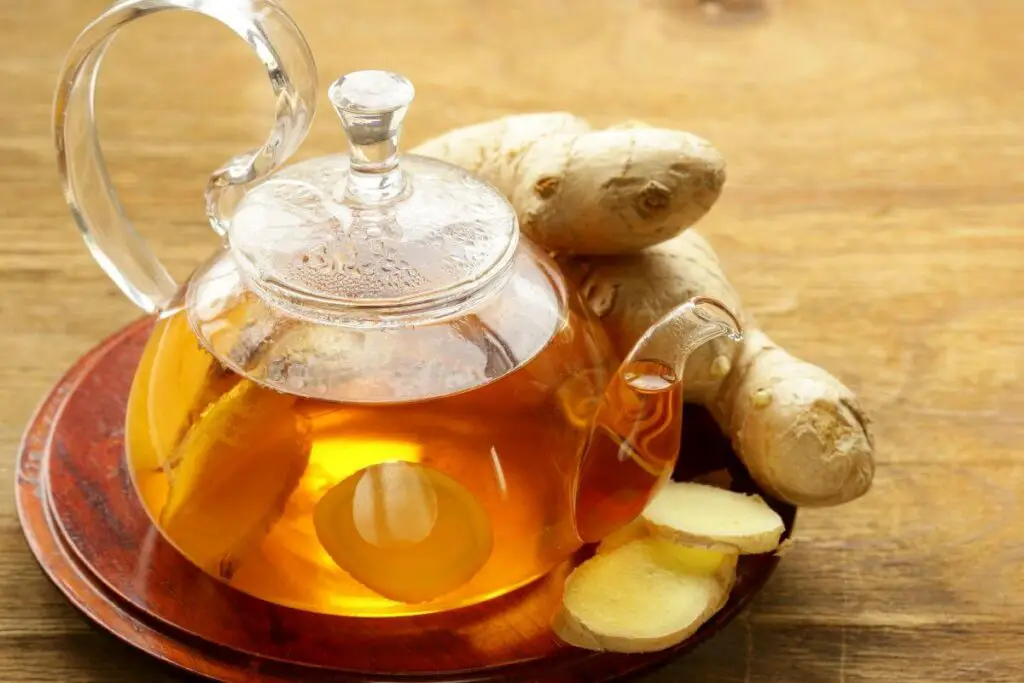
How Drinks Affect Your IBS
Irritable bowel syndrome (IBS) is a common digestive disorder that can cause symptoms like abdominal pain, bloating, and changes in bowel habits. IBS symptoms vary from person to person, but one thing is clear – what you drink can have a significant impact on your symptoms.
The relationship between your beverage choices and IBS symptom management is not to be underestimated. Certain drinks can trigger symptoms due to their effects on the gastrointestinal tract, while others can soothe and support digestion.
For instance, high-FODMAP (fermentable oligosaccharides, disaccharides, monosaccharides, and polyols) drinks like apple juice and high-fructose corn syrup can exacerbate symptoms, while low-FODMAP options like peppermint tea and water can offer relief.
When it comes to managing IBS, the role of drinks is just as important as the food you eat. Choosing the right beverages can contribute to better digestion and overall symptom relief. For example, herbal teas like chamomile or ginger tea can have calming effects on the gut, while drinking plenty of water can help maintain healthy bowel function.
By being mindful of your drink choices and their impact on your digestive health, you can better manage your IBS symptoms. The low-FODMAP diet, which limits certain carbohydrates that can trigger IBS symptoms, is often recommended as part of an overall IBS management plan. This diet extends to beverages, with options like almond milk, coconut water, and certain fruit juices being more IBS-friendly.
Incorporating drinks that are gentle on the digestive system and avoiding those that are known to cause flare-ups can make a notable difference in your IBS symptoms. It’s all about finding the right balance to support your gut health and overall well-being.
1. Water: The Ultimate Hydration for IBS

When it comes to refreshing drinks for IBS relief, nothing beats good old water. Hydration is the cornerstone of a healthy digestive system, and it’s especially vital for those with IBS.
Why Water is Essential for IBS:
- Lubrication: Water helps keep things moving smoothly through your digestive tract, preventing constipation, a common IBS woe.
- Balancing Act: Proper hydration can help regulate bowel movements, reducing the risk of diarrhea.
- Calm and Cool: Staying well-hydrated can also help soothe an irritated gut, which is often more sensitive in people with IBS.
How Much Water is Enough?
- As a general rule, aim for 8-10 glasses (64-80 ounces) of water daily, but listen to your body. If you’re sweating more, exercising, or in a hot climate, you may need more.
Drinking enough water is a simple yet powerful way to support your digestive health, manage IBS symptoms, and keep your body functioning at its best. So, fill up that glass or reusable water bottle and drink to your gut’s content!
2. Low-FODMAP Smoothies: Nutritious and Gentle
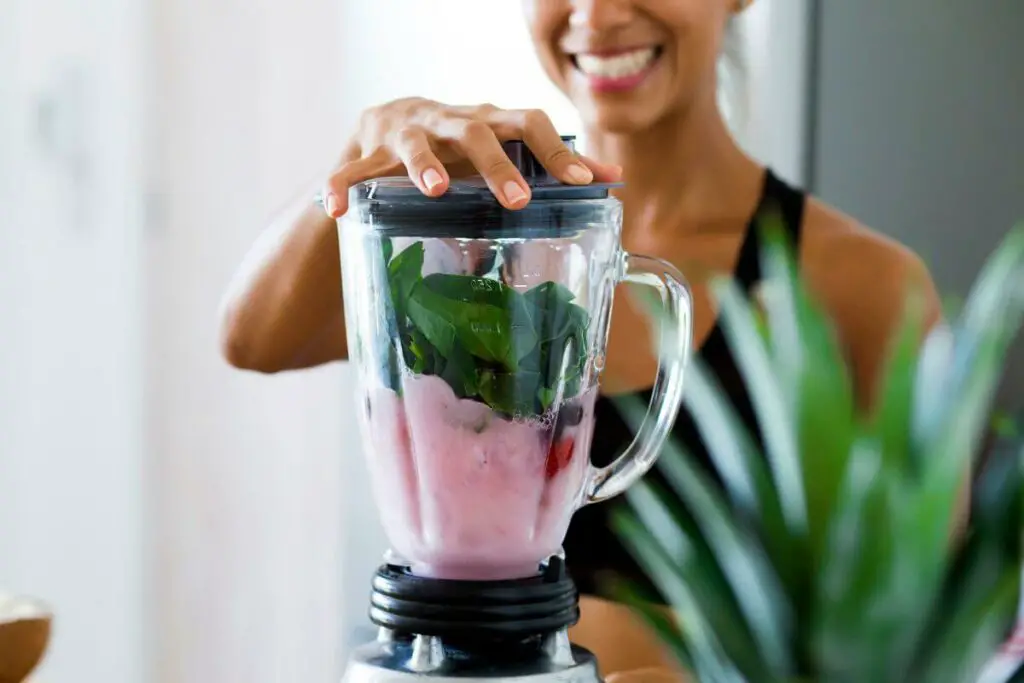
Smoothies are like the chameleons of the beverage world – they can be whatever you want them to be. And when it comes to IBS, low-FODMAP smoothies are a game-changer. By blending fruits and other ingredients low in fermentable sugars, you can enjoy a refreshing drink without triggering your symptoms.
Smoothie Drink Benefits:
- Nutritious: Low-FODMAP smoothies can be packed with essential vitamins, minerals, and antioxidants from fruits like strawberries, blueberries, and bananas.
- Gentle on the Gut: The low-FODMAP nature of these smoothies means they’re less likely to cause bloating, gas, stomach pain, or diarrhea, making them a soothing choice for IBS.
How to Make a Low-FODMAP Smoothie:
- Start with a base of lactose-free or almond milk.
- Add low-FODMAP fruits like kiwi, pineapple, or oranges.
- Include a source of healthy fats or protein such as almond butter or chia seeds.
- Avoid high-FODMAP ingredients like apples, pears, or honey.
A Low-FODMAP Smoothie Recipe to Try:
- 1 cup lactose-free milk
- 1/2 cup strawberries
- 1/2 cup blueberries
- 1 small banana
- 1 tablespoon almond butter
- 1 tablespoon chia seeds
- Ice cubes (optional to make it an iced smoothie)
Now, I know what you might be thinking – “But can a smoothie really be satisfying without high-FODMAP fruits like apples or mangoes?” The answer is a resounding yes. Low-FODMAP fruits can be just as delicious and nutrient-dense, offering a wide variety of flavors to keep your taste buds happy.
So, if you’re looking for a quick, on-the-go option that won’t upset your stomach, low-FODMAP smoothies are a fantastic choice. Just remember, moderation is key, as even low-FODMAP fruits can cause issues if consumed in large quantities. So, blend away and sip on a low-FODMAP delight that your gut will thank you for.
Learn more about Controlling IBS Using Low FODMAP.
3. Herbal Teas: Soothing Your Symptoms
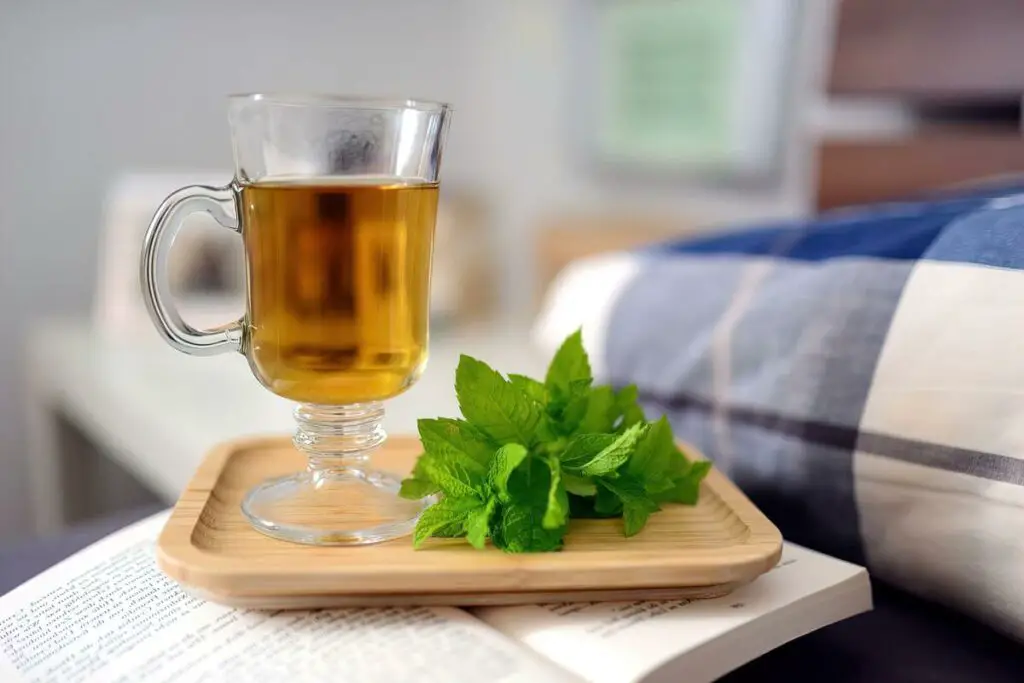
When it comes to calming your gut, the gentle touch of a soothing herbal tea can work wonders.
Herbal teas are a fantastic option for IBS relief, as they’re often caffeine-free and can help to relax the digestive system. Chamomile tea, in particular, has been shown to reduce inflammation and ease muscle spasms in the intestines, providing a calming effect on your gut.
My personal go-to is a warm cup of chamomile tea. It’s like a comforting hug for your insides. Plus, the ritual of sipping a hot beverage can be quite calming in itself, don’t you think?
Here are a few other herbal teas that can be beneficial for your digestive health:
- Peppermint Tea: Known for its ability to ease bloating and gas.
- Ginger Tea: Great for nausea and overall digestion.
- Fennel Tea: Can help to reduce cramping and aid in digestion.
On the flip side, there are some herbal teas you might want to avoid if you have IBS. For example, teas with high levels of caffeine or those that are high in polyphenols, like green or black tea, can sometimes exacerbate symptoms in sensitive individuals.
It’s best to try out the different herbal teas and see what is best for you.
4. Lactose-Free Milk: A Safe Dairy Alternative
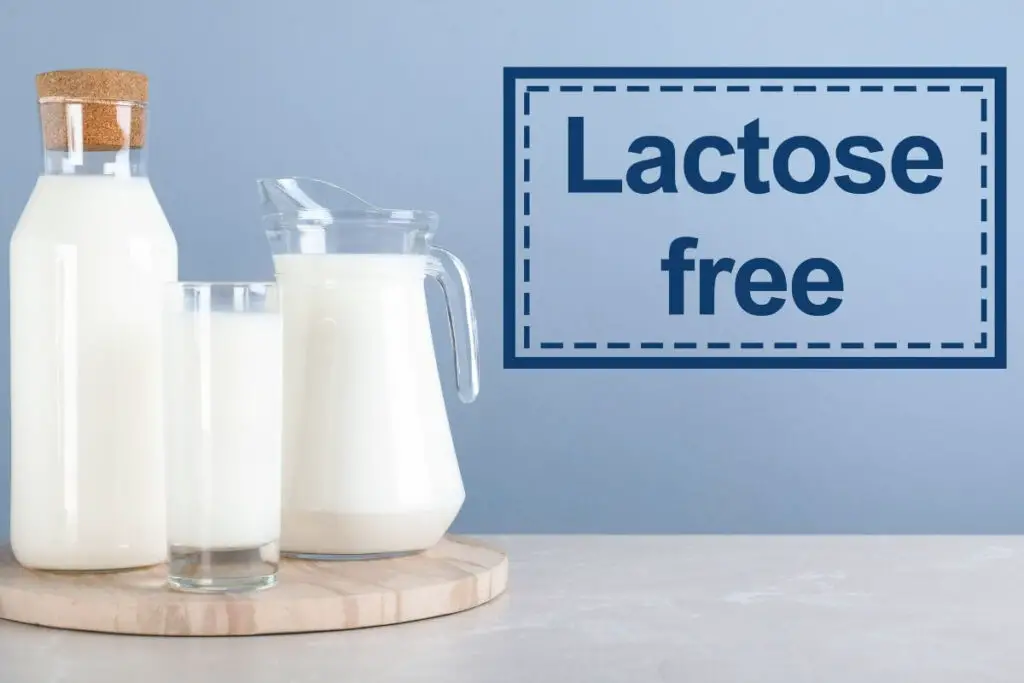
If you’re an IBS sufferer who loves a creamy touch in your coffee or cereal, lactose-free milk can be your go-to dairy alternative. It’s a fantastic option for those with lactose intolerance, a common trigger for IBS symptoms:
- Lactose-free milk is a safe dairy alternative for IBS sufferers, as it’s easier on the gut.
- Milk substitutes like almond, soy, and oat milk can offer variety in flavor and texture.
- Look for unsweetened versions to avoid added sugars.
- Opt for fortified milk substitutes to maintain essential nutrients like calcium and vitamin D.
When your body can’t break down lactose properly, it can lead to uncomfortable symptoms like bloating, gas, and diarrhea – not exactly the breakfast companions you’re looking for.
Lactose-free cow’s milk, derived from regular cow’s milk, is treated with the lactase enzyme, which helps break down the lactose. This process makes it easier on your gut, reducing the likelihood of triggering IBS symptoms.
For those who want to explore beyond lactose-free milk, there’s a whole world of milk substitutes out there. From almond and soy to oat and coconut, these alternatives can offer a variety of flavors and textures to suit your palate. Just be sure to opt for unsweetened varieties to avoid added sugars, which can sometimes exacerbate IBS symptoms.
Gastroenterologists suggest to try out different milk substitutes to find what works best for them. Some people find that almond milk is gentler on their stomachs, while others prefer the creaminess of oat milk.
It’s important to note that not all milk substitutes are created equal. Some may lack the same nutritional profile as cow’s milk, so it’s essential to look for fortified options that provide similar levels of calcium and vitamin D.
Read more about Dairy and IBS Symptoms.
5. Plant Milks: Exploring Non-Dairy Options
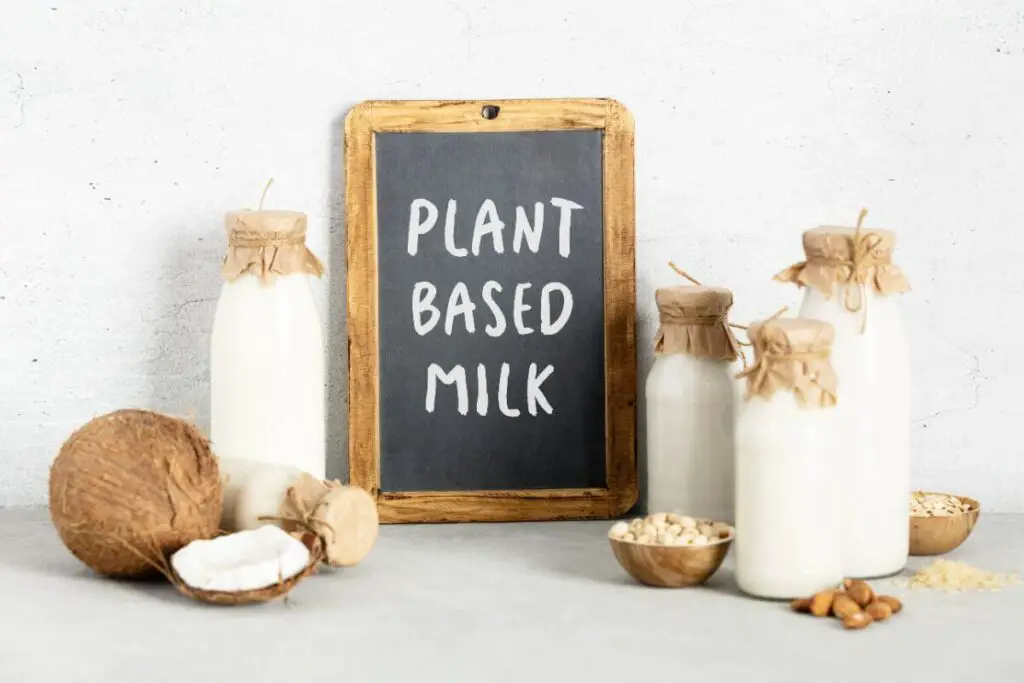
If you’re dairy intolerant or simply looking to switch things up, plant-based milks can be a refreshing IBS-friendly alternative milk.
- Soy Milk: Derived from soybeans, this plant milk is rich in protein and often fortified with calcium and vitamin D, which are important for bone health. It’s a great option if you need that protein punch in your morning cereal or smoothie.
- Almond Milk: Made from almonds, it has a light, nutty flavor and is low in calories. Almond milk is also a good source of vitamin E, an antioxidant that supports immune function. Just be sure to choose unsweetened varieties to keep sugar content low.
- Coconut Milk: This creamy milk, extracted from the flesh of coconuts, is a good option for those on a low-FODMAP diet. It’s rich in healthy fats and can add a tropical twist to your recipes. However, it’s important to note that coconut milk is not as high in protein as other options.
- Oat Milk: One of the newer kids on the block, oat milk is gaining popularity for its creamy texture and slightly sweet taste. It’s also a good source of fiber, which can aid in digestion and help with IBS symptoms.
When choosing plant milks, always look for unsweetened, fortified versions to ensure you’re getting the most nutrients without added sugars. It’s also a good idea to rotate your options to ensure you’re getting a variety of nutrients.
Plant milks offer a diverse range of options for those with IBS, each with its own unique benefits. Whether you’re sipping on soy, almond, or coconut, there’s a plant milk out there to suit your taste and nutritional needs.
6. Probiotic Drinks: Balancing Your Gut Health
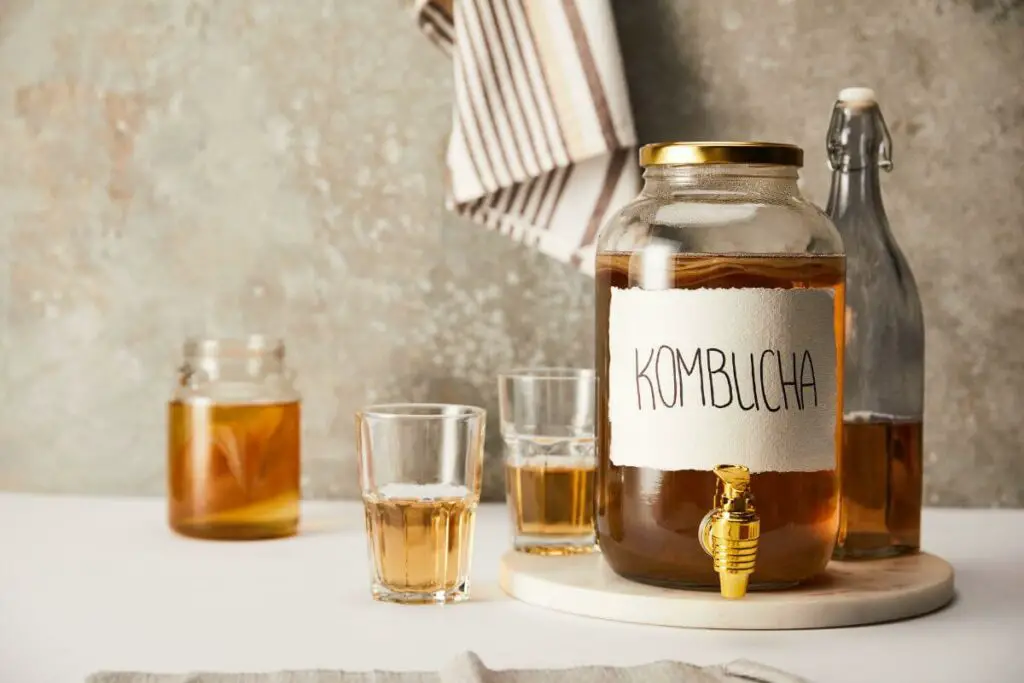
Probiotics are like the superheroes of the gut world, swooping in to restore harmony in your digestive system. These live bacteria and yeasts can help in managing IBS symptoms by promoting a healthy gut flora.
If you’re looking to sip your way to better gut health, consider adding these probiotic drinks to your menu:
- Kombucha: A fizzy, fermented tea that’s rich in probiotics and can aid in digestion.
- Kefir: A tangy, fermented milk drink that’s packed with probiotics, protein, and calcium.
- Yogurt Drinks: Not only are they delicious, but they also contain live and active cultures that can support your gut health.
But hold on, not all probiotic drinks are created equal. Some may contain high amounts of added sugars or artificial sweeteners, which can trigger IBS symptoms and stomach upsets in some individuals. Always check the label and opt for unsweetened or low-sugar varieties to avoid any unwanted surprises.
While these drinks can be a refreshing addition to your diet, it’s important to remember that individual responses to probiotics can vary. What works for one person may not work for another. If you’re new to probiotic drinks, start with small servings to gauge your body’s reaction.
My personal favorite is Kombucha; it’s like a party in your mouth with the added bonus of gut-friendly bacteria. Experiment with different probiotic drinks to find what suits your taste buds and your gut best.
Just remember, moderation is key, and always consult with your healthcare provider if you have any concerns about introducing probiotics into your diet.
7. Decaffeinated Beverages: Reducing IBS Triggers

Decaffeination is the unsung hero for many with IBS. Popular caffeinated drinks, like coffee and tea, can act as a gastrointestinal irritant, leading to discomfort and bowel irregularity. But fear not, you don’t have tosay goodbye to your favorite beverages just yet.
Safe Decaffeinated Options to Sip On:
- Decaf Coffee: A boon for coffee lovers, decaf coffee retains the flavor without the stomach-churning effects.
- Herbal Teas: Opt for caffeine-free herbal teas like chamomile, peppermint, or ginger. Not only are they soothing, but they also aid in digestion.
I, for one, couldn’t imagine starting my day without a warm cup of coffee. But switching to decaf has been a game-changer in managing my IBS symptoms. And if you’re a tea aficionado, exploring the world of caffeine-free herbal teas can be an exciting journey.
Remember, moderation is key. While decaffeinated, these drinks may still trigger IBS symptoms in some individuals. It’s always best to listen to your body and consult with a healthcare provider to find the best options for you.
8. Non-Carbonated Soft Drinks: A Better Choice
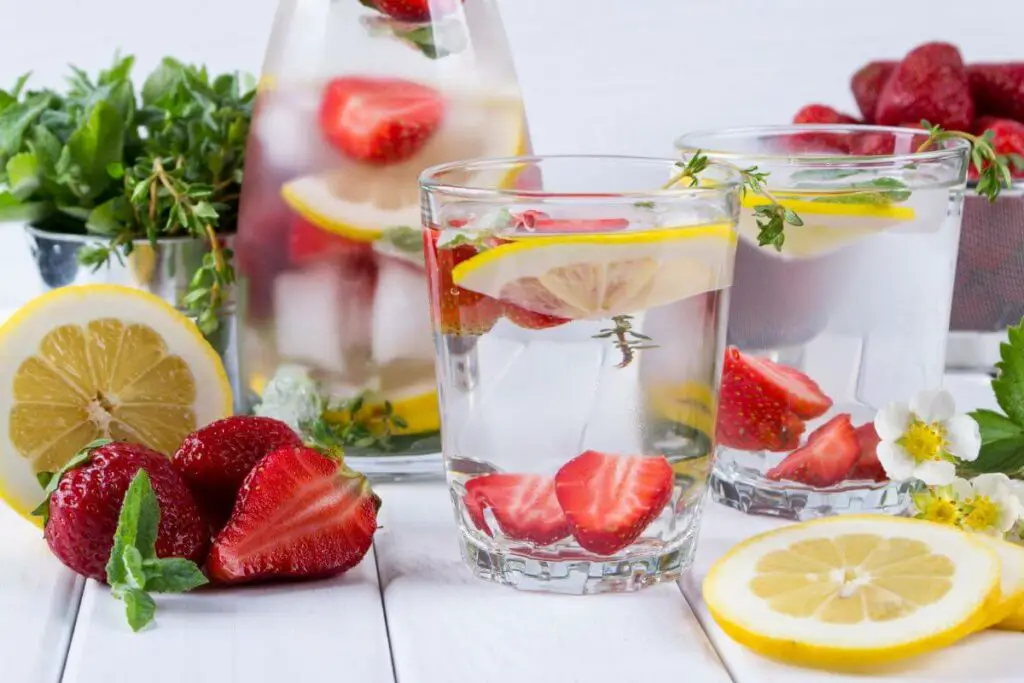
When it comes to beverages, carbonation can sometimes be a bit too much for sensitive tummies. That’s where non-carbonated soft drinks are an IBS-friendly refreshments.
Why are they a better choice, you ask?
Carbonation, the fizz that makes your drink dance on your tongue, can lead to bloating and gas in some individuals. If you’re looking to avoid these symptoms, opting for non-carbonated soft drinks is a smart move.
But there’s more to it than just fizz. Some carbonated drinks may contain sugar alcohols like sorbitol or sweeteners like aspartame, which can also trigger IBS symptoms in certain people.
Here are some examples of non-carbonated soft drinks that you can enjoy without the worry of tummy troubles:
- Herbal teas: Gentle on the stomach and available in a variety of flavors.
- Fruit-infused water: A refreshing and natural way to stay hydrated.
- Coconut water: Packed with electrolytes and easy on the gut.
- Ginger ale (non-carbonated): Offers the soothing properties of ginger without the fizz.
By choosing non-carbonated soft drinks, you’re not only being kind to your gut but also opening up a whole new world of beverage options. So go ahead, explore the aisle of non-carbonated delights and find the ones that tickle your taste buds without upsetting your stomach.
9. Alcohol Alternatives: Enjoying Social Drinks Safely
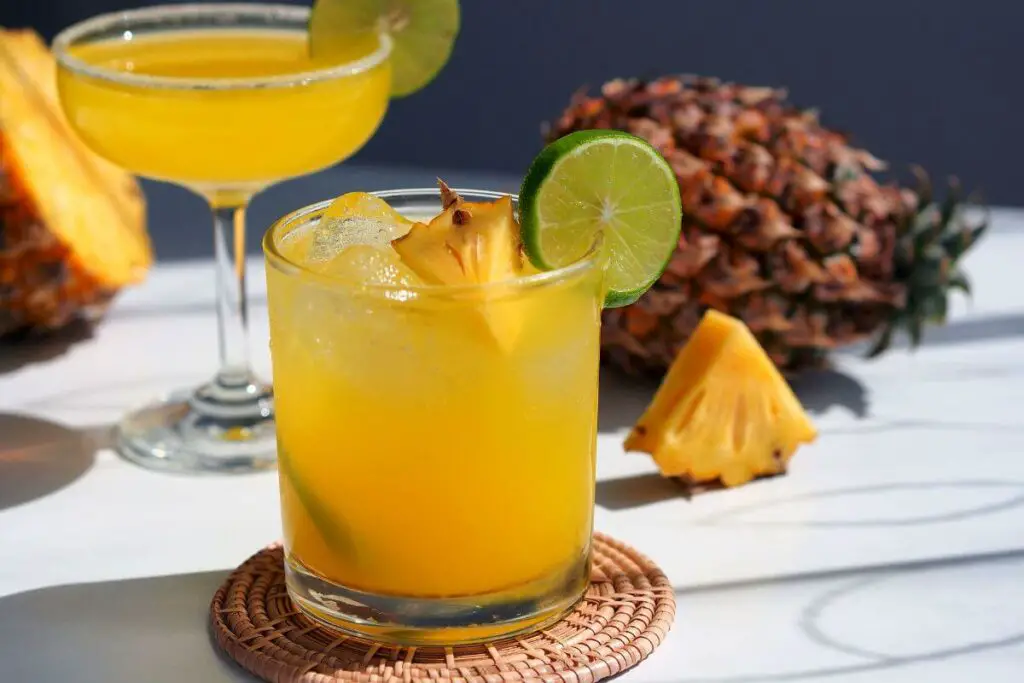
When it comes to socializing, a nice drink can be the cherry on top. But if you’re dealing with IBS, the thought of alcohol can send shivers down your spine. Fear not, my friend, there are low-FODMAP options that can let you enjoy your favorite cocktail without the gut-wrenching aftermath.
- Low-FODMAP Alcoholic Beverages: Opt for spirits like vodka, gin, or whiskey, which are generally low in fermentable sugars. Mix them with low-FODMAP mixers like cranberry or pineapple juice, and you’re good to go.
- Be Wary of Sugary Mixers: The real culprits are the sugary mixers, not the alcohol itself. These can wreak havoc on your gut, so steer clear of high-sugar options like soda or fruit concentrates.
- Moderation is Key: Even with low-FODMAP choices, remember that alcohol, or more specifically, ethanol, can still irritate the gut. Keep your intake moderate, and always drink plenty of water alongside your drinks.
- Non-Alcoholic Alternatives: If you’re looking for a completely alcohol-free option, try mocktails or alcohol-free spirits. There are some fantastic non-alcoholic gin and whiskey options on the market that can give you the same feel without the ethanol.
- Experiment and Listen to Your Body: Everyone’s gut is different, so it’s important to experiment and see what works best for you. Be mindful of your body’s responses and adjust your choices accordingly.
The key here is to be mindful of what you’re drinking and how it might affect your gut. With a little creativity and some careful choices, you can still raise a glass and enjoy your social gatherings without the IBS flare-ups. Cheers to that!
10. Juice Wisely: Selecting Low-FODMAP Fruit Juices
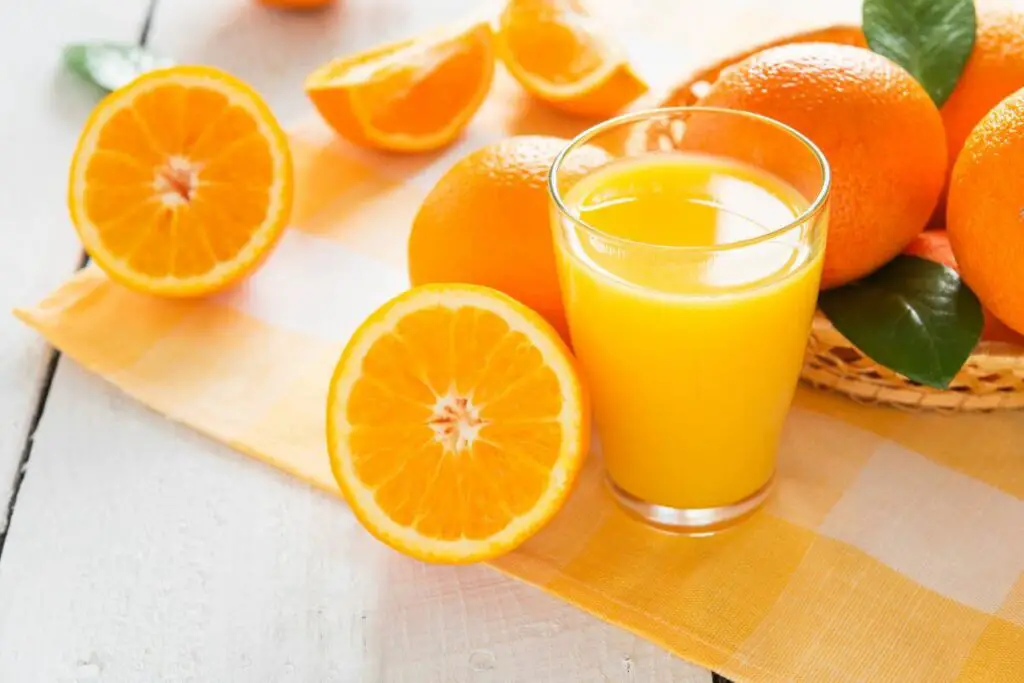
Juicing can be a refreshing way to enjoy the goodness of fruits while sticking to a low-FODMAP diet. But not all fruit juices are created equal, especially when you’re managing IBS.
Here’s how to juice wisely:
- Opt for Low-FODMAP Fruits: Stick to fruits that are low in FODMAPs, such as strawberries, oranges, and pineapples. These are less likely to trigger digestive distress.
- Watch Your Portions: Even low-FODMAP fruits can become high in FODMAPs if you consume large quantities. Stick to recommended portion sizes.
- Choose Fresh Over Store-Bought: Freshly squeezed juices with natural sugar are often a safer bet as store-bought varieties might contain high-FODMAP additives or excess sugars.
- Consider Dilution: If you’re sensitive, diluting your fruit juice with water can help reduce the FODMAP load.
My go-to low-FODMAP fruit juices? A mix of freshly squeezed orange and pineapple juice. It’s a burst of tropical flavor that sits well with my gut.
Remember, moderation is key. While fruit juices can be a part of your low-FODMAP beverage lineup, it’s essential to balance them with other IBS-friendly options like herbal teas and infused waters.
Learn more about Good Fruits for IBS.
11. Bone Broth: A Nourishing and Comforting Drink
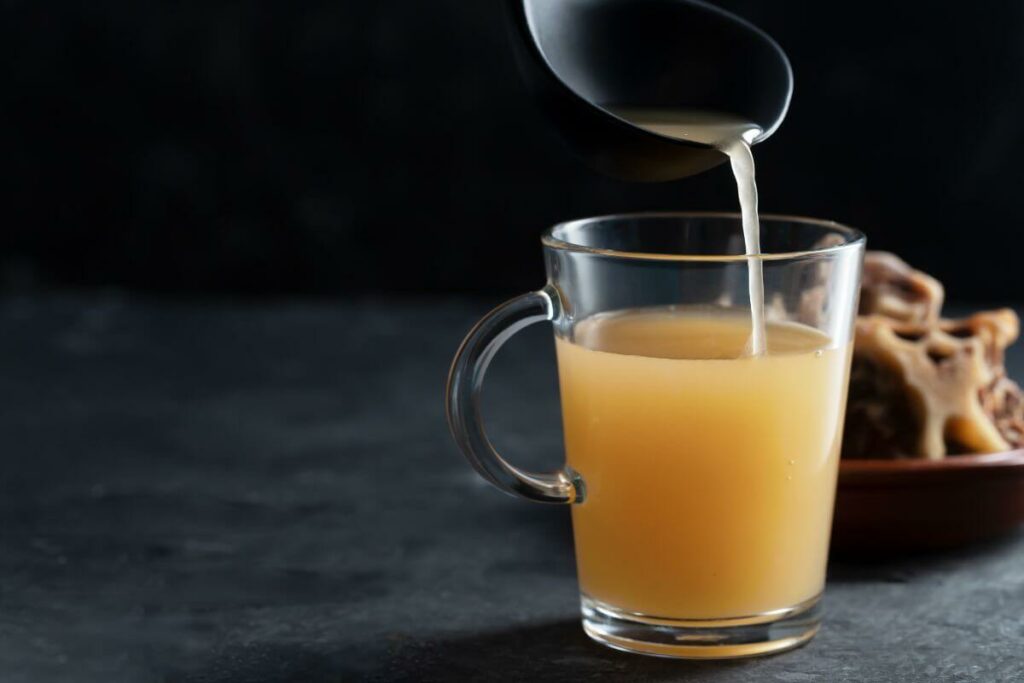
Bone broth is rich in nutrients that are easy on the gut and can be particularly soothing for those with IBS. The collagen and gelatin in bone broth can help repair the gut lining, promoting better nutrient absorption and overall gut health.
When I was in the thick of my IBS struggles, bone broth was a game-changer. It’s gentle on the gastrointestinal tract and provides essential amino acids that support gut function.
Here’s why bone broth can be a go-to for your IBS toolkit:
- Gut Repair: The amino acids in bone broth, such as glutamine, can help repair the intestinal lining, reducing inflammation and promoting gut health.
- Nutrient Absorption: The gelatin in bone broth supports the mucosal lining of the digestive tract, aiding in nutrient absorption.
- Easy Digestion: The easily digestible nutrients in bone broth can provide nourishment without causing digestive distress.
- Hydration: Staying hydrated is key for managing IBS symptoms, and sipping on bone broth can be a tasty way to up your fluid intake.
On the flip side, some store-bought varieties may contain high FODMAP ingredients like onion and garlic, which can trigger IBS symptoms in some individuals. If you’re sensitive to FODMAPs, consider making your own bone broth at home or look for low-FODMAP options.
While bone broth can be a nourishing addition to your IBS-friendly beverage list, it’s important to remember that individual responses can vary. Always listen to your body and consult with a healthcare professional to find what works best for you.
12. Masala Chai: A Spiced Tea for Digestive Comfort
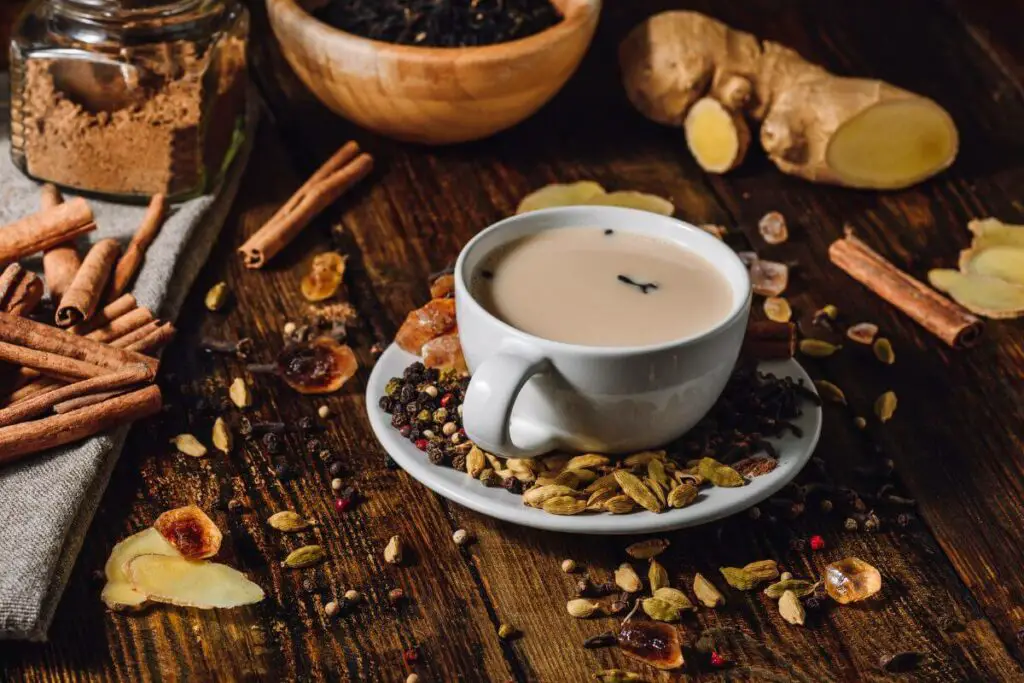
If you’re a tea lover, you’re in for a treat. Masala chai, a traditional Indian spiced tea, can be a soothing choice for individuals with IBS. The blend of spices like ginger, cardamom, and cinnamon not only adds a burst of flavor but also offers potential digestive benefits.
Here’s why masala chai can be a go-to for your digestive comfort:
- Ginger, a key ingredient in masala chai, has been shown to aid digestion by reducing inflammation in the gut.
- Cardamom is known for its carminative properties, which can help alleviate bloating and gas.
- Cinnamon, another common spice in masala chai, may support gut health by reducing the risk of bacterial and fungal infections in the digestive tract.
How to Prepare Masala Chai for Optimal Digestive Support:
- In a saucepan, combine water, milk, black tea leaves, grated ginger, crushed cardamom pods, and a cinnamon stick.
- Bring the mixture to a gentle boil, then simmer for a few minutes.
- Strain the tea into a cup, and sweeten with a touch of honey if desired.
Masala chai is a versatile drink, and you can adjust the spice levels to your preference. Whether you’re enjoying it as a hot drink or as an iced tea, the comforting blend of spices can offer a respite for your digestive system.
Remember, while masala chai can be beneficial for some individuals with IBS, it’s essential to pay attention to your body’s unique response. If certain spices or ingredients in masala chai trigger your symptoms, you may need to customize the recipe to suit your needs.
So, next time you’re craving a warm and flavorful beverage, consider brewing a cup of masala chai. It’s not just a treat for your taste buds; it could be a source of relief for your gut too.
Drinks to Avoid: What Can Worsen IBS Symptoms

Some drinks can be like a double-edged sword for those with IBS. They may seem refreshing at first, but can quickly turn into a nightmare for your gut. Here’s a rundown of what to steer clear of, and why.
When it comes to IBS, the drinks you choose are just as important as the foods you eat. While it’s not necessary to cut out all these drinks completely, it’s a good idea to be mindful of how they affect your body.
If you do indulge, consider keeping a food and drink diary to help identify which ones are your personal triggers. And remember, staying hydrated with water is always a good idea for everyone, IBS or not.
High-FODMAP Beverages to Steer Clear Of
When it comes to managing IBS symptoms, steering clear of high-FODMAP beverages can make a world of difference. High-FODMAP drinks can trigger bloating, diarrhea, and abdominal pain, which are the last things you want to deal with on a daily basis.
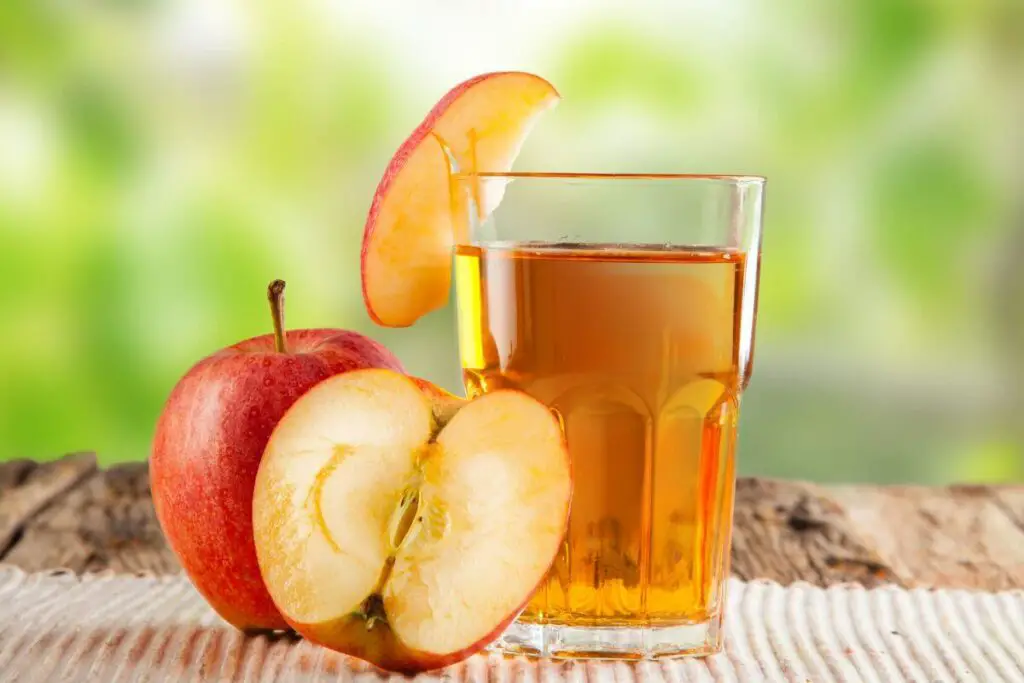
Here are some beverages high in FODMAPs that you might want to avoid or limit:
- Fruit juices: Apple, pear, and watermelon juices
- Sugary drinks: High-fructose corn syrup, agave-sweetened beverages
- Alcoholic beverages: Beer, rum, sherry, and sweet dessert wines
- Dairy-based drinks: Milkshakes, sweetened condensed milk
- Certain teas and coffees: Chai tea, chicory root coffee
- Carbonated drinks: Fizzy drinks and sodas with high-fructose corn syrup
- Sports drinks: High in added sugars and artificial sweeteners
- Meal replacement shakes: Many contain high-FODMAP ingredients like inulin or chicory root
I know, it can feel like you’re giving up a lot of your favorite drinks, but don’t worry. There are plenty of delicious low-FODMAP alternatives that can still give you that refreshing kick without the unwanted side effects.
So, whether you’re sipping on a mint-infused water or a freshly brewed cup of green tea, you can still enjoy a wide variety of beverages that are kind to your gut.
Caffeinated and Sugary Drinks: The Hidden Triggers

Caffeine and sugar – two of life’s little indulgences that can be a big no-no for your gut if you have IBS. Let’s break it down.
Caffeine: It’s a stimulant and might give you an initial burst of energy, but it can also stimulate your gut, leading to increased bowel movements and potential irritation. I’m not saying you have to bid farewell to your morning cup of joe, but moderation is key.
Sugar: The sweet taste of sugar is comforting, but also problematic for IBS. High sugar content in energy drinks or sweetened beverages can ferment in your gut, leading to gas, bloating, and discomfort. It’s like throwing a party in your stomach that no one’s really enjoying.
What’s the bottom line? Be mindful of your caffeine and sugar intake. Here’s a quick comparison table to put things in perspective:
| Beverage Type | Caffeine Content | Sugar Content |
|---|---|---|
| Black Coffee | High | Low |
| Green Tea | Moderate | Low |
| Energy Drink | Very High | Very High |
| Sweetened Iced Tea | Moderate | High |
| Water | None | None |
Consulting a Dietitian: Personalized Advice for Your IBS

When it comes to managing your IBS, a health dietitian can be your secret weapon. I can’t stress enough how crucial it is to receive personalized dietary advice from a health professional who specializes in gastrointestinal issues.
IBS is a complex condition, and what works for one person might not work for another. A dietitian can help you navigate the dietary dos and don’ts specific to your symptoms and triggers.
So, how do you find a dietitian that’s right for you? Start by looking for a Registered Dietitian Nutritionist (RDN) with expertise in gastrointestinal health. You can ask for referrals from your primary care physician or gastroenterologist, or use online directories like the Academy of Nutrition and Dietetics to find a specialist in your area.
Once you’ve narrowed down your options, don’t be afraid to interview potential dietitians. Ask about their experience in treating IBS, their approach to personalized nutrition, and how they collaborate with your healthcare team. This is your health we’re talking about, so it’s important to find someone you feel comfortable working with.
A dietitian isn’t just there to tell you what to eat and what to avoid. They’re your partner in creating a sustainable, enjoyable diet that supports your gut health. They can help you identify trigger foods, suggest suitable alternatives, and guide you in making long-term lifestyle changes to improve your health benefits.
Don’t underestimate the power of personalized dietary advice when it comes to managing your IBS. A dietitian can be the missing piece in your health puzzle, helping you find relief and regain control over your gastrointestinal health.
Final Thoughts: Drinks for IBS Relief

In the grand scheme of managing IBS, what you drink can be just as important as what you eat. From soothing herbal teas to hydrating coconut water, the right drinks can help alleviate IBS symptoms and promote digestive health on a daily basis.
By sticking to low-FODMAP drinks and steering clear of known triggers like caffeine and alcohol, you can take a proactive approach to managing your IBS. It’s all about making informed choices that work for you and your unique digestive system.
So, as you start the journey of finding the perfect drinks for your IBS, here are some final tips to keep in mind:
- Listen to your body: Pay attention to how different drinks affect your symptoms and adjust your choices accordingly.
- Stay hydrated: Water is your best friend. It’s essential for overall health and digestive function.
- Seek professional guidance: If you’re unsure about which drinks are best for you, consult with a registered dietitian or gastroenterologist.
Remember, there’s no one-size-fits-all solution when it comes to managing IBS. What works for one person may not work for another. The key is to be patient, stay informed, and be open to trying new things.
So, as you navigate the sometimes choppy waters of digestive health, arm yourself with the knowledge and tools to make the best decisions for your body. Here’s to finding your perfect IBS-friendly beverage that not only soothes your gut but also tantalizes your taste buds.
Cheers to your digestive health and well-being! Here are some other articles if you have IBS to help you with your diet:
- Meat and Irritable Bowel Syndrome
- Snacks and IBS
- Are Grains Bad for IBS?
- Raw Vegetables and IBS
- Dietary Gluten and IBS
- https://www.ncbi.nlm.nih.gov/pmc/articles/PMC7019579/
- https://www.ncbi.nlm.nih.gov/pmc/articles/PMC8241212/
- https://www.hsph.harvard.edu/nutritionsource/food-features/coffee/
- https://doi.org/10.1186/s41043-017-0113-1
- https://pubmed.ncbi.nlm.nih.gov/26290295/
- https://www.monashfodmap.com/about-fodmap-and-ibs/high-and-low-fodmap-foods/

